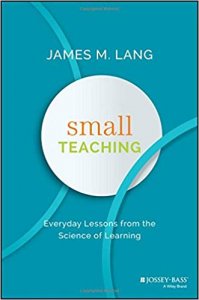 My final post about James Lang’s book Small Teaching focuses on using prediction as a way of engaging our students before they learn. Lang explains that by asking students to predict an answer or trend or result before they learn about it, they are more likely to remember that material later, even if their predictions were incorrect. What happens, Lang explains, is that as the brain searches for the answer, it is making connections and activating prior knowledge. Therefore, when the real answer is given, the brain is ready to “slot the answer. . . into a more richly connected network of facts” (49).
My final post about James Lang’s book Small Teaching focuses on using prediction as a way of engaging our students before they learn. Lang explains that by asking students to predict an answer or trend or result before they learn about it, they are more likely to remember that material later, even if their predictions were incorrect. What happens, Lang explains, is that as the brain searches for the answer, it is making connections and activating prior knowledge. Therefore, when the real answer is given, the brain is ready to “slot the answer. . . into a more richly connected network of facts” (49).
I experienced this phenomenon first hand this past week at a session I attended at the POD conference. At the start of one session on what to do about students’ use of phones in class, the presenter gave us some research on multitasking. She gave us time to read an overview of the study and then asked us to individually choose one of four possible results. We had to write down our answer then discuss our answers with our table. After a few minutes of table discussion, we had to agree on an answer and write it down. Then, all together, she had us hold up our answers. We then discussed our competing answers briefly before she revealed the actual results. This approach engaged the entire room and, indeed, I still recall the result of the study even though my initial prediction and my table’s prediction were wrong. Additionally, once I and then my group had made our predictions, I had some skin in the game. I wanted to know if I was right, so I paid close attention to the information that followed.
So consider how you could have your students make predictions. It could be a pretest, a short survey, a show of hands, a quick write, or an individual then group prediction with discussion. And if you want to learn more about prediction or the first five minutes of class or ways for students to practice retrieval, check out Lang’s book. It is available in the CIE Library, or contact me if you want your own copy.


Thanks for sharing that experience, Kristen. You’ve got me interested in reading this. I notice the library’s print copy is checked out for right now, but we have an ebook version here: https://ebookcentral.proquest.com/lib/osterlin-ebooks/detail.action?docID=4455000